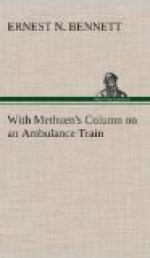After various toasts—the Queen, our General, Absent Friends and so on—several comrades from other corps dropped in and every one was called upon for a song. It is curious to find the extraordinary popularity amongst soldiers of lugubrious and doleful songs. The majority of our songs at that Christmas dinner dealt with graves and the flowers that grew upon them, on the death of soldiers and the grief of parents. One song, I remember, was almost ludicrously sad. It told how a young soldier on active service in the Sudan or some other distant region hears, apparently by telepathic means, that his mother—the conventional grey-haired mother—is in some distress. The soldier at once, without any attempt to secure leave of absence, sets out for “home” on foot. He is brought back, and, as the excuse about his mother is very naturally discredited, the deserter is sentenced to be shot. Just as his lifeless body falls back riddled with bullets the mother arrives—how, it is not explained—so, as the refrain has it, “The Pardon comes too late”. There were also several pauses in the conversation for “solos from the band,” to wit, a flute and a fiddle.
After dismantling the marquee and dinnertable we started through the darkness for Modder River. We had thoroughly enjoyed our Christmas fare, and K——, a Scotchman, attempted with some success to perform a sword-dance on two crossed sticks, and when we pulled up at some station with a Dutch name his fervid patriotism broke loose in an attempt to address the people on the platform, whom he apostrophised as “rebels” and threatened with dire vengeance. Our cook was equal to the occasion. He dragged K—— back and apologised to the aggrieved colonists, explaining—by a pious fraud—that he was K——’s father and so responsible for bringing him out that evening. Our gleemen now stepped into the breach with “Ye Banks and Braes,” and we left the station amid cheers.
Another of my friends under the excitement of song and mirth frequently clutched my arm and pointed to imaginary batches of Dutchmen standing suspiciously near the line and presumably intent on wrecking the train. These were usually prickly-pear bushes. When we approached Modder River he exclaimed that we were now within range of the Boer guns, and accordingly pulled up the windows as a sort of protection against shells and bullets.




